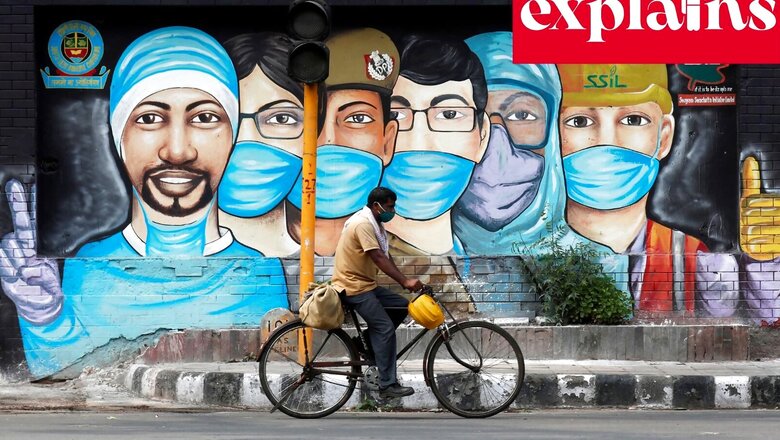
views
After news of Covid-19 again surging across various countries, especially China, one wonders – when will it end? After three years of the pandemic, there is no dearth of studies and reports on the detrimental effect the experience has had on us, and not just physically, but mentally.
2022’s end has again brought forth that fear. No doubt covid-anxiety and depression will surge as people wonder about a possible next wave.
The government has called for precautions across India, but many experts have reassured that a combination of factors – including the hybrid immunity built over many seasons of Covid, and a wide vaccination coverage, may be our saving grace.
But it’s not always possible to assuage the mind or even be completely assured of the future as the pandemic continues, especially while still dealing with the after-effects and trauma of Covid.
What should one do in such a situation, then? News18 explains:
Limiting News Intake
In 2020, researchers in Poland discovered that the second most important factor associated with Covid-19 anxiety was how much news people watched about the virus.
According to a report by Forbes, the more information we have about Covid-19, the more likely we are to perceive the threat as dangerous, and the more likely we are to experience elevated levels of Covid-19 anxiety.
The researchers discovered that the presence of chronic health conditions, age, and general health condition — all of which have been shown to increase the threat posed by Covid-19 — were less predictive of coronavirus anxiety than news exposure.
This does not mean that one should ignore news until the pandemic has passed.
Rather, it should serve as a gentle reminder to keep an eye on the amount of Covid-19 data one is letting in, the report explained.
“Media attention may have been a mixed blessing,” the researchers, led by Marta Malesza of the University of Economics and Human Sciences in Warsaw, Poland told Forbes.
“On the one hand, rapid communication of the risks of infection would seem to promote healthy behavior change and reduce the spread of contagion. On the other hand, mass media coverage of a pandemic can potentially lead to mass hysteria and fear.”
Don’t Forget About Precautions
While experts will always keep debating on the risk of Covid-19, what we can do in the moment is to minimise the risk we feel against Covid-19 amid anxiety.
Simply following the measures set over the past three years: wearing masks, avoiding huge crowds, getting vaccinated, using sanitisers, and keeping a check on one’s health will help whether or not there is a wave incumbent or not.
The government has also asked people to continue with precautions. READ MORE on this
Practicing Self-Control
Self-control has always been an essential component of success. People who can resist temptations and delay gratification have been shown to be healthier, wealthier, and happier.
But it’s not just that. The Forbes report explains how research indicates that self-control is more important than ever.
People with high self-control were better able to stick to their pre-pandemic routines, had an easier time developing new goal-directed behaviours, and were more effective at turning these new positive behaviours into habits, according to a team of psychologists led by Michail Kokkoris of Vrije University in the Netherlands.
“Even though the world has changed dramatically,” state the researchers, “high self-control people demonstrate a remarkable capacity to stick to pre-existing habits and have the flexibility to develop new habits that better meet situational demands.
The combination of these two — maintaining old habits while developing new ones — is the recipe for success in turbulent times for people with strong self-control.”
Diet is one area where self-control is especially important given the current circumstances.
We all spend an inordinate amount of time at home, and the pantry is just a few steps away. According to a recent study, “lack of appetite or overeating” is the depressive symptom that has increased the most since the pandemic began.
Be mindful of your eating habits and, to the greatest extent possible, exercise self-control, the report said.
Having Distractions
“Psychologists know that when people are in chronically difficult conditions it’s helpful to divide the problem into two categories: things they can do something about, and then things they can do nothing about”, Dr. Lisa Damour, expert adolescent psychologist, best-selling author and monthly New York Times columnist was quoted as saying by the New York Times.
There will be a lot in the second category right now, which is fine, but distractions can help us cope. Dr. Damour suggests doing homework, watching favourite movies, or reading books as ways to make life easier and find balance in everyday life.
This can also work as a coping strategy for you.
Read all the Latest Explainers here




















Comments
0 comment